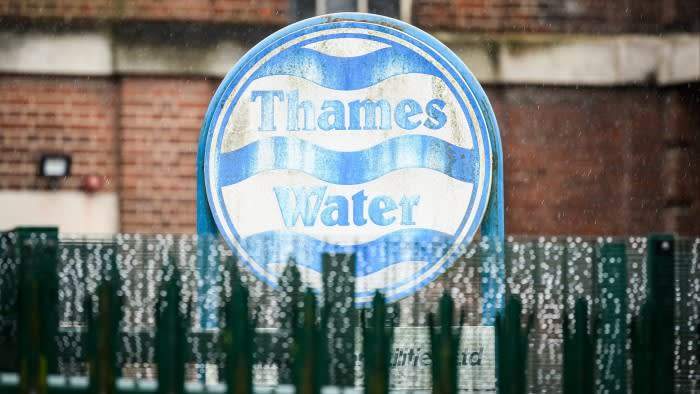Stay informed with free updates
Simply sign up to the Utilities myFT Digest — delivered directly to your inbox.
Thames Water’s owners will start urgent restructuring talks in the coming days as parent company Kemble risks entering insolvency within weeks unless lenders agree to a debt-for-equity deal, according to people familiar with the matter.
Alvarez & Marsal, the restructuring experts, will discuss all options with creditors, which include bank lenders and bondholders, as the government tries to avoid a temporary renationalisation of the UK’s largest water utility.
The future of beleaguered Thames Water has become an acute political headache for Prime Minister Rishi Sunak, who risks a crisis at the company crystallising before the general election expected this year.
Thames Water has a complex group structure with seven layers between the parent company and the operating company, which is regulated by Ofwat and collects customer bill payments.
The group as a whole is saddled with at least £18.3bn of debt, which has become increasingly expensive to service because of the sharp rise in interest rates since late 2021.
A £190mn loan is due for repayment at Kemble by the end of April.
Thames Water has said the operating company has £2.4bn in “cash and available committed facilities” and can continue to function for at least another 15 months even if parent company Kemble goes into administration.
On Thursday Thames Water shareholders said they had lost patience with regulator Ofwat, and were not prepared to invest new money, even if that meant an estimated £5bn writedown.
The nine shareholders, which include the Chinese and Abu Dhabi sovereign wealth funds as well as Canadian and UK pension funds, are adamant that Ofwat’s regulatory posture makes the company “uninvestable”. Two of the largest shareholders — pension funds Omers and USS — have already taken large writedowns.
Ofwat said this week: “We need to ensure that the sector attracts investment and is fair to bill payers.”

Three directors of Thames Water group entities have quit in recent days, a “sign that the restructuring is on the way,” said Adam Leaver, professor at the audit reform lab at the University of Sheffield.
“This is going to be a messy and protracted series of negotiations and it’s unclear how quickly the situation is going to be resolved,” he added.
Thames Water has asked Ofwat to approve a 56 per cent real-terms increase in bills by 2030 as well as leniency on dividend rules and fines for pollution and other service failures.
On Thursday, Kemble’s shareholders said Ofwat, which is independent from the government, had refused to budge after a year of discussions.
As a result they had decided not to inject an initial downpayment of £500mn, which they had previously pledged subject to conditions by the end of March, let alone the entire £3.25bn needed by 2030.
People close to the investors said that even this was the minimum amount of cash needed given the scale of investment needed at the business.
Ofwat will make its draft determination in June with a final agreement not until December. Such a fluid regulatory situation will make finding new investors more difficult.
Thames Water, which needs billions of pounds of investment to replace ageing infrastructure, is already struggling to keep up with maintenance. It faces a public outcry over sewage.
On Saturday University of Oxford rowers criticised sewage levels in the river Thames after members participating in the annual Oxford-Cambridge Boat Race became unwell. High levels of E coli have been found in the river.
A third of Thames Water’s sewage monitors do not work properly, according to new analysis of Environment Agency data by the Liberal Democrats, compared to 15 per cent of monitors across the industry.
The price of a bond issued by Kemble slumped to just 15 per cent of face value on Thursday as debt investors rushed to sell on speculation that Thames Water could be renationalised.
Kemble and Thames Water declined to comment.
